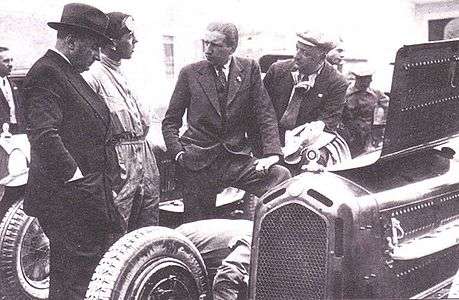Eduardo Weber

Edoardo Weber (29 November 1889 – 17 May 1945)[1] was an Italian engineer and businessman, famous for creating the Weber carburetor.
He was born in Torino to a Swiss father and mother from Piemonte. After graduating in mechanical engineering from the Università degli Studi di Torino (1913) he moved to Bologna to work for Fiat. He was a tutor to Amédée Gordini and, at Mugello, he raced a Fiat 501 to third place on 13 June 1920.[2]
His work to remedy high gasoline prices resulted in the first Weber carburetor, a "sidedraft, twin-choke ... bolted to a Weber designed overhead-valve/supercharger conversion for the 501 Fiat". In 1923 he established the Fabbrica Italiana Carburatori Weber company, which under his leadership became supplier to Fiat mass-produced cars as well as small-volume Alfa Romeo and Maserati racing cars.
Weber was with the Italian Fascist Party.[3] In 1937 he received the Order of the Crown of Italy and in 1943 the Order of Merit for Labour.
Bologna was liberated on April 21 of 1945 by Italian Co-belligerent Army. Three weeks later, on May 17, 1945, Weber was picked up from his office early in the morning by civilians who came to the factory in Via Del Timavo 18. He was never seen since, assumedly executed by the Italian resistance movement.
After his disappearance in May 1945, Fiat eventually assumed control of the company in 1952.
In the Certosa di Bologna there is an empty tomb.[4] His widow Anna (1897–1985)[5] wrote a biography in 1972.[6]
References
- ↑ "Informazioni Edoardo Weber".
- ↑ "Eduardo Weber at a driver database".
- ↑ "Weber carbs". Autosport.
- ↑ Monomento ad Edoardo Weber in Storia e memoria di Bologna.
- ↑ His wife's year of death is mentioned in LASCIA IN EREDITA' AI CARABINIERI QUASI 2 MILIARDI in La Repubblica on February 26, 1992.
- ↑ Anna Bolelli Weber, Edoardo Weber, Accorsi, Bologna, 101 pages, 1972.